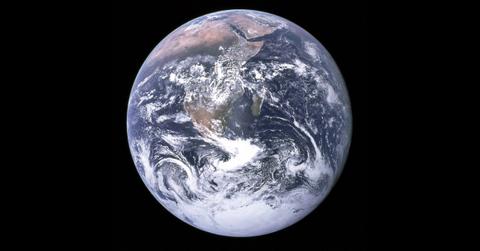End Days? Researchers Warn Passing Star Could Cause Interplanetary Collision, Fling Earth Past Pluto

The ‘overview effect’ is caused by the sight of Earth from space.
Dec. 7 2023, Published 1:03 p.m. ET
A potential encounter with a passing star passing Earth could plunge humanity into chaos, according to a new report.
If such a star were to approach our solar system too closely, there is a chance our planet could be flung past Pluto and into the Oort cloud, NewScientist.com reported.
NewScientist.com noted how the potential consequences of such a catastrophic event could also send Earth out of our solar system, cause it to collide with another planet or absorbed by the passing star.
This situation also extends to other planets in our solar system, with Mercury facing the risk of getting flung into the sun.
The projections about the possible scenarios are derived from simulations conducted by Sean Raymond and his team at the University of Bordeaux in France.
Through 12,000 simulations, the researchers determined that there is a one percent chance that a passing star could approach our solar system within 100 astronomical units (AU) in the course of the next billion years, NewScientist.com reported.
Remarkably, the researchers found to their surprise that there is a 92 percent chance that all planets in our solar system would be unscathed from such an encounter.
- Did a Close Encounter with a Star Alter Earth’s Orbit and Increase Temperatures?
- Preparing for Impact: NASA's ‘Planetary Defense’ System Searching Space for Asteroids Capable of Causing 'Extinction Event'
- What Lies Beneath: NASA Scientist Believes Aliens May Have Found 'Perfect' Hiding Spot in Earth's Oceans
The chances of Earth being flung into a cooler part of the galaxy, such as the Oort cloud, were found to be only 0.28 percent, and the odds of our planet colliding with the sun were equally low.
The possibility of Earth colliding with another planet was approximately twice as likely, a prospect that reasearchers described as unfavorable for humanity.
Never miss a story — sign up for the Front Page Detectives newsletter. Be on the scene the moment news breaks.
In the most probable scenario, aside from everything remaining stable, there is a 2.54 percent chance of Mercury getting flung into the sun.
Raymond suggested earthlings come up with a solution, "either by modifying Earth's orbit or blocking a fraction of the Sun's incoming energy," according to LiveScience.com.
Other recent discoveries, like a newly identified six-planet solar system in the Milky Way, exemplify the ongoing advancements researchers and scientists exploring the vast expanse of space are now making.
Become a Front Page Detective
Sign up to receive breaking
Front Page Detectives
news and exclusive investigations.
